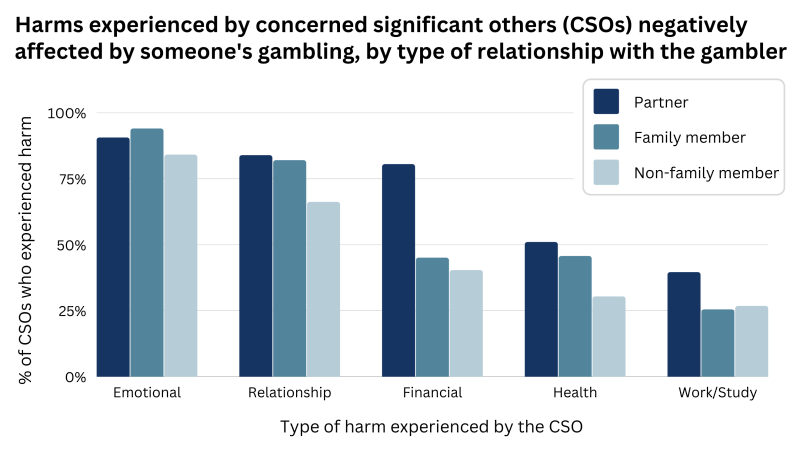Read the original article on the basis website HERE.
By Kira Landauer, MPH
Gambling can lead to adverse consequences, including financial, social, emotional, occupational, and physical harms. Not only do these harms impact the gambler, but they can ripple across their social network and negatively affect the gambler’s intimate partners, family, and friends (referred to as concerned significant others, or CSOs). This week, The WAGER reviews a study by Nerilee Hing and colleagues that examined the prevalence of CSOs harmed by gambling in Australia, and the types of harms experienced by these CSOs based on their relationship to the person who gambles.
What were the research questions?
What is the national prevalence of CSOs harmed by gambling in Australia? What are the types and frequencies of harms experienced by CSOs based on their relationship to the person who gambles?
What did the researchers do?
The researchers conducted a national mobile telephone survey with 11,560 respondents in Australia during October and November of 2019. The sample was weighted to align with the current population of Australia. Participants were asked whether they had been personally affected by another person’s gambling in the past 12 months; those who responded yes were defined as a CSO. These respondents were then asked about their relationship with the person whose gambling most affected them, and also selected which of 25 harms they experienced because of that person’s gambling. Harms were classified into five categories: (1) emotional, (2) financial, (3) health, (4) relationship, and (5) work/study.
What did they find?
Six percent of respondents reported that they had been negatively affected by another person’s gambling in the past 12 months. CSOs were most often affected by a non-family member’s gambling (39.4%), followed by any family member’s gambling (38.9%). Women were more likely than men to experience harm due to their child’s or a current or former spouse/partner’s gambling, whereas men were more likely than women to experience harm due to the gambling of a non-family member (e.g., a friend or coworker).
Emotional harms were the most frequently reported category of harm overall (89.3%) and across all types of CSO-gambler relationships (see Figure). Relationship harms were the second most frequently reported category of harm (76.2%). The least reported category of harm by CSOs was work/study (29.1%). Overall, CSOs experienced a mean of 7.2 harms (median = 6). CSOs impacted by a former spouse/partner’s gambling reported the greatest number of harms, followed by current spouse/partner, parents, and children, respectively. CSOs affected by a work colleague or others’ gambling reported the least number of harms. Spouses/partners and family members were more likely than non-family members to report emotional, relationship, and health harms. CSOs harmed by a current or former spouse/partner’s gambling or their child’s gambling were most likely to experience harm in the majority of harm categories. Finally, women reported experiencing a higher number of harms (mean = 7.7) than men (mean = 6.54).

Figure. Harms experienced by concerned significant others (CSOs) who have been negatively affected by someone’s gambling in the past 12 months, by the type of relationship with the gambler and type of harm. Relationship types were categorized as partner (current spouse/partner; former spouse/partner), family member (parent; sibling; child; other relative) and non-family member (friend, work colleague/other). Total sample size is n = 686. Click image to enlarge.
Why do these findings matter?
These findings add to our understanding of the negative impacts that gambling can have on the individuals within a gambler’s social network. Findings from this study demonstrate the need to recognize and support CSOs in coping with a loved one’s gambling; a specific focus should be placed on supporting spouses, partners, and close family members of the gambler, who are likely to experience the greatest number of harms. Providers should be aware of how to support their clients who are negatively affected by a loved one’s gambling. Additionally, support services tailored to women CSOs are needed given that women CSOs are more likely to experience a greater number of harms due to a loved one’s gambling than men.
Every study has limitations. What are the limitations of this study?
Respondents only reported on harms experienced from the person whose gambling harmed them the most. It is possible that respondents were impacted by more than one person’s gambling but that information was not captured in this study. This study did not include or report on gambling harms experienced by children. As such, the findings are likely only generalizable to the adult population.
For more information:
Do you think you or someone you know has a gambling problem? Visit the National Council on Problem Gambling for screening tools and resources. Gam-Anon is a community of self-help support groups for concerned significant others impacted by a loved one’s gambling.

